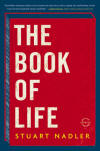The Book of Life
The seven stories that make up Stuart Nadler’s spirited debut collection, The Book of Life, are about men: husbands and boyfriends, fathers and brothers, sons and grandsons. They’re about relationships, the mistakes and the misunderstandings. As a whole, the collection strikes a balance between characters who reclaim a portion of what is lost and those who are humbled by their circumstances and left to persevere. Infidelity is the crux of six out of the seven stories, but Nadler’s characters find surprises inside surprises inside surprises, spiraling the life out of any potential clichés.
The seven stories that make up Stuart Nadler’s spirited debut collection, The Book of Life, are about men: husbands and boyfriends, fathers and brothers, sons and grandsons. They’re about relationships, the mistakes and the misunderstandings. As a whole, the collection strikes a balance between characters who reclaim a portion of what is lost and those who are humbled by their circumstances and left to persevere. Infidelity is the crux of six out of the seven stories, but Nadler’s characters find surprises inside surprises inside surprises, spiraling the life out of any potential clichés.
The title story, “The Book of Life,” begins and ends with the Days of Awe—a ten-day period of introspection in the Jewish faith between Rosh Hashanah and Yom Kippur—during which the characters, long-standing family friends, inadvertently trade one act of infidelity for another. Abe, a normally faithful husband, takes an uncharacteristic misstep that reels him headlong towards a swift and unexpected retribution. “He was not the sort of man to do such a thing. This was something he knew, unquestionably, in his heart.” Yet, Abe acts exactly as “the sort of man” he believes himself incapable of becoming, undermining the confidence that previously shored his convictions. When the tables are turned, “Suddenly, he found himself quite unsure what to think,” and irony overshadows his Day of Atonement.
Likewise, Eric, in “Our Portion, Our Rock,” blurs the lines between friendship and romantic love. After falling victim to an interminable string of sad events, he turns to a good friend, who’s married to his best friend, for illicit comfort. In “Beyond Any Blessing,” Daniel and Shari, once childhood sweethearts, struggle to maintain the physical boundaries against their unrelenting affection. Daniel, now married to Denise, tells the reader, “The best love affairs, I’d learned, die with incredible slowness.” When temptation persists, Shari holds her ground by mimicking a Shomer Negiah, an Orthodox Jew who restricts physical contact with a member of the opposite sex:
“It was a choice they made. But they always tried to find ways to circumvent it. They’d put a blanket between themselves and a boy and they’d hug or they’d hold hands with gloves on.”
“That sounds horrible.”
“It’s a way of cheating the forbidden,” she said, and then she sat up in bed, took a piece of her bedsheet, wrapped it around her hands, and softly, as if she were afraid that she might hurt me, she put her hand flat against my heart.
Despite the rituals and themes inherent to Judaism and referenced in many of the stories, the conflicts on the page translate to any reader concerned with issues of identity, loss, and frustrated desire. There is also appeal in the good dose of wit that tempers some rather tragic events. As one of Nadler’s characters puts it, “The line between humor and sadness is especially thin.” As in life, there are laugh-out-loud moments within the direst of situations.
Several of the stories revolve around family tensions and father/son dynamics. In “Winter on the Sawtooth,” Lewis’s newly devout son, Josh, returns home from college to grapple with his parents’ pending divorce. While Josh is shocked by his mother’s sudden impropriety and his father’s relaxed attitude, Lewis tries to field his son’s awkward questions about his wife’s behavior:
What I want to say is that her taking a lover is, in my opinion, a reaction to Josh going away, first the fear of it, and then the actuality of his absence. This is her way of filling an empty nest she wants nothing to do with, a crazy way of complicating her life. I may be wrong, of course. Peggy once told me that being wrong was a skill at which I was particularly gifted. But I can’t say any of this to my son.
In “Visiting,” Jonathon takes his disgruntled teenaged son, Marc, on a road trip to meet a grandfather that Marc never knew existed. Jonathan’s attempt to express confidence in his decision quickly pales as he drives closer to his childhood home, rife with bad memories. When Jonathon tells Marc an appalling secret about his childhood, thereby revealing his overt vulnerability, the barrier begins to break down between father and son.
Finally, in “The Moon Landing” and “Catherine and Henry,” read to explore ways in which some relationships can heal and forgive, and thereby transform, but perhaps never return to the way they once existed.
In fact, there’s not a story in the bunch that doesn’t express multiple levels of transformation as the result of characters doing the hard work of looking at their lives with an unqualified honesty. Whether victims of fate or perpetrators of misdeeds, and with little left to lose, the characters’ ability to persevere leaves readers believing in second chances.





